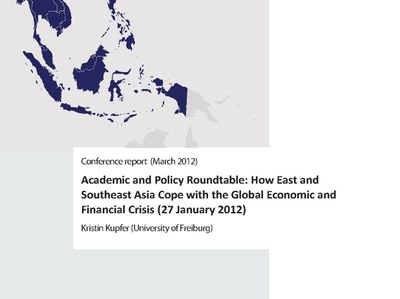News & Events Archive
LECTURE | Prof. Rüland: lecture at the conference „Strengthening Political Accountability in Southeast and East Asia" (26 May 2012, Trier/ Germany)

Prof. Rüland holds a lecture at the conference „Strengthening Political Accountability in Southeast and East Asia: Approaches, Achievements and Setbacks During the Past Decade“, which takes place from 25 May till 26 May 2012 in Trier, Germany.
JOUR FIX | Dr. Susan Engel: Shaming and Sanitation in Indonesia – a return to colonial public health? (22 May 2012, Freiburg)
Dr. Susan Engel holds a lecture on "Shaming and Sanitation in Indonesia – a return to colonial public health?".
COLLOQUIUM | Interdisciplinary Assessments of Area Studies (23 may 2012, 4pm - 5.30pm, Seminarraum Ethnologie)
The second Collaborative Colloquium of the semester will augment the preparation for the "Methodology in Southeast Asian Studies" conference at the end of the month.
COLLOQUIUM | Prof. Michael Ewing-Chow: "A Theory of ASEAN Integration" (27 April 2012, 11h - 12.30h, room 1021)
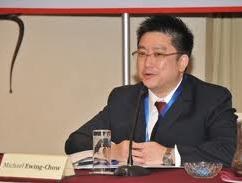
This colloquium will be presented by Michael Ewing-Chow, Associate Professor and WTO Chair in the Faculty of Law at the National University of Singapore.
TEACHING | Courses on Southeast Asia in the Summer Term 2012
The departments of Political Science, Cultural and Social Anthropology, Economics and History of Freiburg University are offering several courses on Southeast Asia in the upcoming summer term.
LECTURE | Prof. Schlehe: "New Cosmopolitanism in the Popular Spirit(ual) World "
The lecture by Prof. Dr. Judith Schlehe on "New Cosmopolitanism in the Popular Spirit(ual) World" was held in Jawaharlal Nehru University at the International Conference on "Studying Social Sciences in the Era of Globalisation", New Delhi, India, 30 March - 02 April 2012.
NEW PUBLICATION | S. Rother: Wendt meets East: ASEAN cultures of conflict and cooperation

(...) This article proposes a ‘via media’: a theoretical approach that can be applied to Western and non-Western IR alike, taking into consideration the specific historical, ideational and cultural contexts. Based on social constructivism as developed by Alexander Wendt, it is argued that the existence of a collective identity among states in a given region can manifest itself in distinctive logics or cultures of anarchy. These are based on norms of conflict or cooperation that can be established through interaction, can be proposed by outside agents and localized, or can be affected by the re-negotiation of state identity caused by domestic events. In addition, there are cultural path dependencies: norms rooted in the cultural memory or consciousness of a region which tend to be ignored by interpretations that merely focus on current events or established Western models of cooperation. Area studies can contribute to provide this context.
CONFERENCE | Methodology in Southeast Asian Studies (29-31 May 2012)
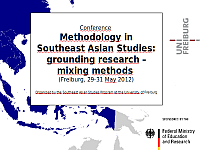
Leading international scholars will join us in this second conference organized by the Southeast Asian Studies Program at the University of Freiburg. Please contact us if you are interested to participate as a guest.
FIELDTRIP | Prof. Rüland carried out a fieldtrip for Singapore University project "Integration through Law"
Within the context of the National University of Singapore project "Integration through Law", from 13th-23rd March 2012 Prof. Jürgen Rüland took a fieldtrip to Singapore for research purposes.
LECTURE | Krisztina Kis-Katos: "Does local governments' responsiveness increase with decentralization and democratization? Evidence from sub-national budget allocation in Indonesia"
The paper "Does local governments' responsiveness increase with decentralization and democratization? Evidence from sub-national budget allocation in Indonesia" (Krisztina Kis-Katos/ Bambang Suharnoko Sjahrir) was presented by Krisztina Kis-Katos at the Second World Congress of the Public Choice Societies in Miami, Florida, March 8-11, 2012.
NEW PUBLICATION | J. Rüland: The rise of "diminshed multilateralism"
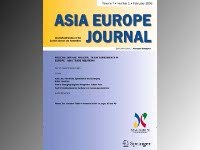
This article on East Asian and European forum shopping in global governance argues that the “principled multilateralism” of the immediate post-Cold War period is increasingly giving way to what may be called a “diminished multilateralism.” Newly emerging global and regional powers such as the BRICS states (Brazil, Russia, India, China and South Africa) and other rising powers in the Global South are increasingly questioning the legitimacy of the existing international architecture which they regard as a vehicle of the USA and Western countries to conserve their international influence in an era of rapid change ...
LECTURE | Prof. Schlehe: "Cosmopolitanism in the Modern Mystical World of Java"
Australian National University, ISEAC Cosmopolitan conference 2012: On Cosmopolitanism and Southeast Asia: imaginings, mediation and movement. Canberra, Australien, 16 - 18 February 2012
LECTURE | Christian von Lübke: Topographies of Power

The political economy of public goods provision in the post-Marcos Philippines (6 February 2012, 8pm, HS 1015)
LECTURE | Prof. Derichs: Transformation, Democratization and Islamization in Southeast Asia from a Gender Perspective

30 January 2012, 8pm, HS 1015
Academic and Policy Roundtable | “How East and Southeast Asia Cope with the Global Economic and Financial Crisis”
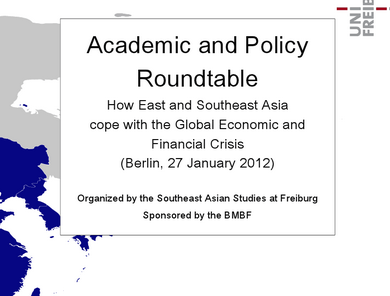
The BMBF-sponsored Southeast Asia Study Group at Freiburg organized an Academic and Policy Roundtable on the Global Economic and Financial Crisis and the responds of (South)East Asian nations. The Roundtable took place on January 27th, 2012 in Berlin (Germany).
ACADEMIC & POLICY ROUNDTABLE | “How East and Southeast Asia Cope with the Global Economic and Financial Crisis”

In 2012, the BMBF-sponsored Southeast Asia Study Group at Freiburg organizes an Academic and Policy Roundtable on the Global Economic and Financial Crisis and the responds of (South)East Asian nations. The Roundtable will take place at January 27th, 2012 in Berlin (Germany).
COLLABORATIVE COLLOQUIUM | Dr. Markus Mietzner: "Democratic Transitions Compared"

This colloquium will be presented by Dr. Marcus Mietzner, a guest fellow of Southeast Asian Studies at Freiburg. The talk focuses on the similarities and differences between the democratic transitions in Indonesia and Egypt. Particular attention will be paid to the role of the military in both transitions, with the army in Egypt constituting a much higher obstacle to democratization than its Indonesian counterpart. The importance of the divisions between Islamists and liberals will also be discussed, as will be the quality of electoral management and party organization. (24 January 2012, 6pm, Dpt. of Anthropology, Seminarraum)
LECTURE | Prof. Aurel Croissant: Civil-military relations in Southeast Asia

19 January 2012, 8pm, HS 1199
LECTURE | Ambassador Djoko Susilo: "Strengthening political parties to support the democratization process in Indonesia"

11 January 2012, 6pm, HS 3042




